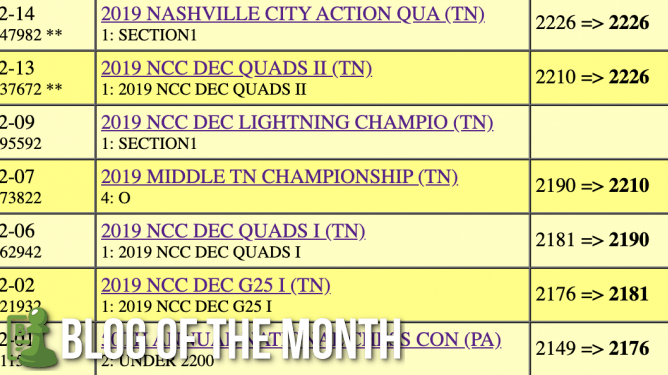
How I Became A National Master
Like Dvoretsky, I think that (all other things being equal), the analytical method of studying chess must give you a colossal advantage over the chess pragmatist, and that there can be no certainty in chess without analysis. —Garry Kasparov
Six months ago, I was a blitz specialist and a relatively poor standard player. I consistently practiced chess for years without actively playing in USCF tournaments, allowing me to reach a 2500+ blitz rating on chess.com (typical for FMs) but because I wasn't regularly playing slow games or practicing my calculation, my USCF rating was only in the expert range. After the disaster of a tournament at the National Open, I realized that I couldn't rely only on training that improved my understanding of chess and intuition (especially since it is harder to improve your intuition as an adult), I also had to work on my calculation and my logical thought process.
An example of how poor my thought process was can be illustrated by the critical moment below.
Therefore, I started dedicating approximately 2-3 hours per day to calculation training and theoretical textbooks on improving my thought process (such as Think like a Grandmaster, Thinking Inside the Box, Excelling at Chess Calculation, and some books from Aagaard's Grandmaster Preparation series). I also started playing as many USCF rated tournaments as I could in order to get practice applying the methods I was learning in books and refine my calculation game by game.
At first, virtually nothing changed in my results. I repeatedly failed to apply the methods that I was learning from the books I was studying and my thought process mistakes were numerous and absurd. My logical application was chaotic (I didn't know how to use the information I received in my calculation) and my calculation was significantly less structured than it should be. I understood in theory what I needed to do, but I seemed to be unable to consistently apply it. Some examples:
I made many other absurd mistakes related to my thought process/calculation including blundering my queen against a 1400 (yes, I lost), drawing a 1700 from a winning position due to many irrational choices/failing to count the material properly(!), and flagging a drawn position (up time!) with a 10 second increment. Despite these hiccups, I was on the verge of several wins or draws against titled players (with increased consistency in calculation structure), so I was hopeful that I would be able to become a strong titled player if I continued to work on my thought process and calculation.
Though results were slow, I kept training. I deeply analyzed my losses and tried to diagnose the cause of my mistakes. I noticed several recurring themes in my mistakes and attempted to consciously avoid these mistakes in over the board games. Success started to slip through the cracks, partially due to the increased structure of calculation and partially due to gaining experience in over the board chess. Here is one example:
Recently my thought process training pushed my over the board results to a tipping point that allowed me to surge through NM (2149 USCF --> 2226 USCF in 2-3 weeks); I haven't lost any of my last 20 USCF rated standard games. The first major sign of a breakthrough occurred at the National Chess Congress (I tied for first place), where I managed to get a lot out of the time control lengthening (rounds 1 and 2 were g50/d5 while rounds 3-6 were 40/100 + SD/30; d10). Here are some examples from the surge to NM.
